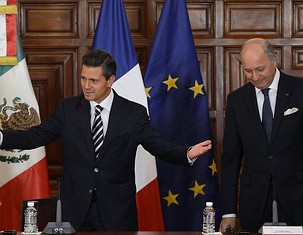Mexico City, Mexico — France’s foreign minister called on Monday for a far-reaching collaboration with Mexico, officially burying a diplomatic squabble that roiled relations between the two nations for years.
French Foreign Minister Laurent Fabius hailed Mexico as a vital partner in a chaotic world in which he asserted that the US is no longer the sole, overarching power.
"For a long time, we lived in a bipolar world. Then it became unipolar," Fabius said, referring to the 1989 fall of the Berlin Wall and the 1991 collapse of the Soviet Union. "France and Mexico hope for a multi-polar world with an equitable balance of power."
But he said the reality is that the world today is "zero polar," without a dominant power to force solutions on issues such as the civil war in Syria that the United Nations said last month had taken more than 92,000 lives.
Fabius’ speech came amid carefully choreographed moves to overcome a crisis triggered by the 2008 conviction of a Frenchwoman for her alleged part in a Mexican kidnapping ring. Mexico’s highest court ordered the woman, Florence Cassez, freed in January, saying her arrest and conviction were plagued with irregularities. She immediately returned to France.
Tensions over the Cassez affair peaked in 2011 when Mexico canceled its participation in a year of activities in France to celebrate Mexican culture.
Polls showed nine out of 10 Mexicans believed Cassez was guilty of taking part in the Zodiaco kidnapping ring along with her Mexican boyfriend, even as some had qualms about Mexico’s administration of justice; French public opinion widely saw her as a victim of corrupt authorities.
Fabius didn’t mention the Cassez issue in his talk before a packed auditorium at the Mexican Secretariat of Foreign Affairs, hours before he was to meet President Enrique Pena Nieto. He heaped praise on Mexico and said the two nations should take more "concrete actions" before the "grave crises facing the world," adding that the two have moral weight that go beyond demographic size and economic clout.
"When Mexico and France act as one, they can be a powerful force," Fabius said.
France has accepted an invitation for President Francois Hollande to make a state visit in 2014, Fabius said, the 50th anniversary of a visit by President Charles de Gaulle to Mexico.
Fabius said France and Mexico share common views on free markets, the battle against terrorism, opposition to the death penalty, and the need for urgent action to combat global warming.
Mexico’s history is deeply intertwined with France, most notably when French troops arrived in Mexico in 1861 to carve a dependent empire and establish a puppet monarchy. Mexican resistance at the Battle of Puebla in 1862 is commemorated to this day with the Cinco de Mayo festival. France's puppet monarchy was overthrown in 1867, restoring the republic to Mexican hands.
Mexican Foreign Secretary Jose Antonio Meade celebrated France’s national day last Sunday alongside Fabius, declaring the onset of a "new chapter in the historic and fraternal relations between our two countries."
Meade said French culture has been a powerful magnet for Mexican intellectuals, noting that renowned painter Diego Rivera, Nobel laureate writer Octavio Paz as well as fellow writer Carlos Fuentes and philosopher Alfonso Reyes lived for periods in France, nurtured by the "intellectual audacity" of the nation.
The arrival of new administrations in both countries allowed France and Mexico to set aside the Cassez dispute. Both Mexican and French voters ditched support for leaders of center-right parties last year, swinging their countries to the political center and left and opening the door to a renewal in relations.
Fabius noted that French-Mexican bilateral trade amounted to only $3 billion last year, much of it in the aeronautical industry, but that trade can "multiply" in spheres like energy and telecommunications.


